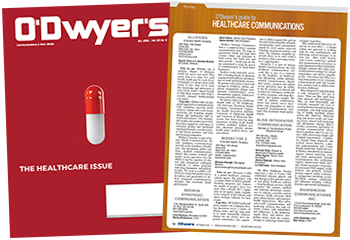|
|
Seemingly calm on the surface from a global perspective, trust in healthcare and its sub-sectors tells quite a different story when a deeper dive is made into local market data, according to Edelman’s 2018 Trust Barometer. Now in its 18th year, the firm’s annual trust and credibility survey found major fluctuations across the 28 markets we study.
Globally, trust in healthcare lost only two points from the previous year, remaining well within the trusted range, with a score of 63. On a local level, however, trust in healthcare declined in 17 of the 28 markets. And, healthcare was the least trusted industry sector of 15 studied in the Trust Barometer in key markets such as the U.S., Brazil and Japan, among others.
Drilling down even further, trust in the five sub-sectors of healthcare Edelman studies — Pharmaceuticals, Biotech/Life Sciences, Consumer Health, Hospital/Providers and Insurance — made minimal progress globally, if any, compared to the previous year. Pharma and Consumer Health maintained neutral scores of 55 and 56, respectively, from the previous year; Biotech / Life Sciences dropped one point to a score of 62, although remained trusted; Insurance gained one point to 58; and Hospitals / Clinics gained three points, moving to a score of 72.
However, when viewed market by market, trust scores varied much more dramatically. For example, trust in Pharma plummeted in the United States, dropping 13 points from the previous year to 38, its lowest score ever in the Trust Barometer. This sub-sector saw declines across 13 markets in total, as well as the largest gap between the most trusting country (Indonesia, with a score of 85) and the least (Germany, with a score of 30). Another alarm for pharmaceutical companies: the least-trusting countries, Germany, France and the U.S., also saw the biggest drops in trust this year, a red flag given their market size and that these are home countries for the headquarters of several global pharmaceutical companies.
What’s causing these local swings in trust? Around the world, healthcare companies — and pharmaceutical companies particularly — have been thrown into a war of words about who’s to blame for the high cost of healthcare. While the blame game may seem to be the most heated in the U.S., it’s spreading on a worldwide scale. Edelman believes that rather than clearing any one healthcare group from perceived wrongdoing, this ongoing public argument has had the unintended consequence of lowering trust across the entire healthcare industry. No sub-sector of healthcare is coming out ahead, and instead, it has served to amplify that health costs are rising with no solution yet in sight.
To regain footing from this year’s global and local drops in trust, the health industry must pivot from the blame game around cost and show how they’re part of the solution. The Trust Barometer also shows companies must address the demands of an increasingly global yet polarized world.
There are a number of ways to build trust:
Be the lab, not the sales force. Edelman’s Trust data show that while people tend to trust the sub-sectors of healthcare they associate with promising innovation, like Biotech, goodwill may evaporate at the prescription counter. Health companies must double down on messaging around their benefits to society or run the risk of promising advances being overpowered by the pricing outrage cycle. This includes focusing messages around R&D, innovation and hard science, versus profits, sales and marketing.
Sell more than the product. Patients are looking to health companies to build and create solutions beyond the pill. Edelman data also show the general population generally has positive sentiment toward the future of health technology and its implications for health and healthcare. While developing new treatments is expected of the industry, providing holistic solutions will further build trust. Health companies must show how they are treating the whole person.
Humanize the approach. Healthcare companies should look to those trusted within the industry — like hospitals and clinics — and determine how they could establish a more personal connection with patients. For example, humanizing what happens in the laboratory by showcasing the real scientists behind a breakthrough, or creating a campaign where patients are heard and can contribute rather than just feeling they’re simply the target of promotions for a new drug.
Localization leads. Despite the global footprint of many companies across the industry, healthcare is always a local experience; availability of care, treatments, insurance and more varies considerably by market. Communications marketing activities must be tailored locally, by country and by audience, meeting local standards and local expectations. One size doesn’t fit all in global communications.
To regain trust, healthcare companies must address both unmet patient needs and the costs of care, as well as provide solutions beyond products to improve patient outcomes. Healthcare companies have ample room to share how they’re doing this through their own content and platforms; this year we have global data that shows the content provided by health companies is viewed as credible, while only 53 percent trust health news reported by the media. This is a clear opportunity for health companies to use their own media channels and share their stories through interactive, creative content.
***
Susan Isenberg is Edelman global health sector chair.

 Susan Isenberg
Susan Isenberg

 Lo Isidro, senior director at Real Chemistry with more than a decade of strategic communications and PA experience, has joined Narrative Strategies.
Lo Isidro, senior director at Real Chemistry with more than a decade of strategic communications and PA experience, has joined Narrative Strategies. Nelson Fernandez, former North American chair of APCO Worldwide and managing director of Burson-Marsteller, has joined Volunteers in Medicine Berkshires as director of communications and PA.
Nelson Fernandez, former North American chair of APCO Worldwide and managing director of Burson-Marsteller, has joined Volunteers in Medicine Berkshires as director of communications and PA. Lilit Bargar, who was most recently an EVP in the healthcare practice at Weber Shandwick, comes on board at GCI Health as EVP, corporate practice lead.
Lilit Bargar, who was most recently an EVP in the healthcare practice at Weber Shandwick, comes on board at GCI Health as EVP, corporate practice lead.
 Five ways that successful thought leaders are made.
Five ways that successful thought leaders are made.


 Have a comment? Send it to
Have a comment? Send it to 
No comments have been submitted for this story yet.